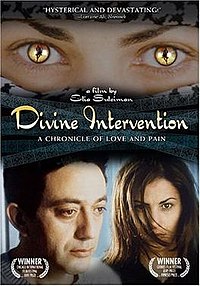Divine Intervention (2002 film): Difference between revisions
mNo edit summary |
cited facts |
||
| (One intermediate revision by the same user not shown) | |||
| Line 4: | Line 4: | ||
One lyrical section feature a beautiful sunglasses-clad Palestinian woman (played by [[Manal Khader]]) whose passing by not only distracts all eyes, but whose gaze causes Israeli military checkpoint towers to crumble. The director features prominently as the film's silent, expressionless protagonist in an iconic and powerfully moving performance has been compared to the work of [[Buster Keaton]], [[Jim Jarmusch]] and [[Jaques Tati]] [http://www.miftah.org/Display.cfm?DocId=2295&CategoryId=24] [http://www.indiewire.com/people/people_030115elia.html]. |
One lyrical section feature a beautiful sunglasses-clad Palestinian woman (played by [[Manal Khader]]) whose passing by not only distracts all eyes, but whose gaze causes Israeli military checkpoint towers to crumble. The director features prominently as the film's silent, expressionless protagonist in an iconic and powerfully moving performance has been compared to the work of [[Buster Keaton]], [[Jim Jarmusch]] and [[Jaques Tati]] [http://www.miftah.org/Display.cfm?DocId=2295&CategoryId=24] [http://www.indiewire.com/people/people_030115elia.html]. |
||
Despite being nominated for the "[[Palme d'Or]]" award at the [[2002]] [[Cannes Film Festival]], the film's consideration as candidate for Best Foreign Film at the Academy Awards was an occasion for considerable controversy. |
Despite being nominated for the "[[Palme d'Or]]" award at the [[2002]] [[Cannes Film Festival]], the film's consideration as candidate for Best Foreign Film at the Academy Awards was an occasion for considerable controversy. It was alleged that the film was denied consideration by the California-based [[Academy of Motion Picture Arts and Sciences]] because Palestine was not a country, but spokesperson John Pavlik stated that the Academy had never made a decision on that issue because Suleiman had never submitted his film. Some have claimed that the Academy's decision was based on political considerations [http://www.villagevoice.com/film/0304,fahim2,41328,20.html] [http://www.palestinemonitor.org/comments/comments.html] [http://www.muslimwakeup.com/main/archives/2003/03/divine_interven.php] [http://citypaper.net/articles/2002-12-25/movies.shtml]. The film was however considered for an Oscar the following year; Pavlik told ''[[Variety (magazine)|Variety]]'' "The committee decided to treat Palestine as an exception in the same way we treat Hong Kong as an exception. It's always the goal of the foreign-language film award executive committee to be as inclusive as possible."[http://news.bbc.co.uk/2/hi/entertainment/3209974.stm] |
||
==External links== |
==External links== |
||
Revision as of 18:05, 7 November 2005

Divine Intervention (Arabic: yadun ilahi يد إلهي) is a 2002 film by the Israeli Palestinian director Elie Suleiman, which may be described as a surreal black comedy. The film consists largely of a series of brief interconnected sketches, but for the most part records a day in the life of a Palestinian living in East Jerusalem, whose girlfriend lives several checkpoints away in the West Bank city of Ramallah.
One lyrical section feature a beautiful sunglasses-clad Palestinian woman (played by Manal Khader) whose passing by not only distracts all eyes, but whose gaze causes Israeli military checkpoint towers to crumble. The director features prominently as the film's silent, expressionless protagonist in an iconic and powerfully moving performance has been compared to the work of Buster Keaton, Jim Jarmusch and Jaques Tati [1] [2].
Despite being nominated for the "Palme d'Or" award at the 2002 Cannes Film Festival, the film's consideration as candidate for Best Foreign Film at the Academy Awards was an occasion for considerable controversy. It was alleged that the film was denied consideration by the California-based Academy of Motion Picture Arts and Sciences because Palestine was not a country, but spokesperson John Pavlik stated that the Academy had never made a decision on that issue because Suleiman had never submitted his film. Some have claimed that the Academy's decision was based on political considerations [3] [4] [5] [6]. The film was however considered for an Oscar the following year; Pavlik told Variety "The committee decided to treat Palestine as an exception in the same way we treat Hong Kong as an exception. It's always the goal of the foreign-language film award executive committee to be as inclusive as possible."[7]
